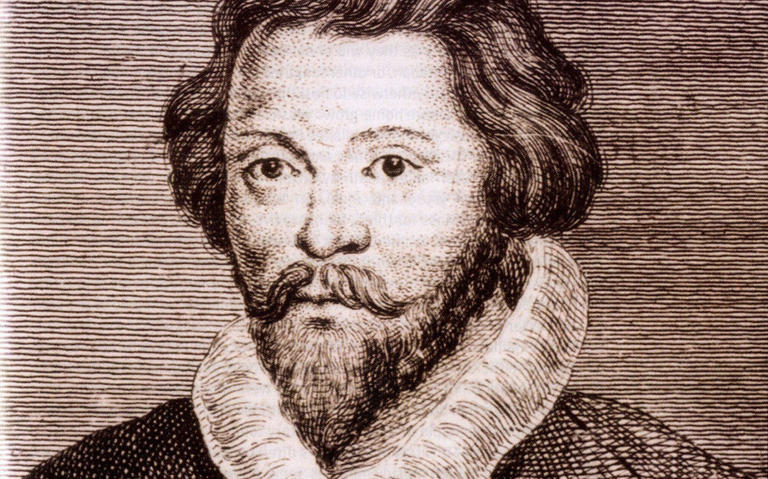SACRED MYSTERIES: WHEN WILLIAM BYRD PUBLISHED WORKS PERFORMED IN SECRET Opinion by Christopher Howse: The Telegraph










Sacred Mysteries: When William Byrd published works performed in secret
The composer William Byrd was “Our Phoenix”. So said his younger contemporary Henry Peacham. By “Our”, he meant England’s, and by “Phoenix”, he meant a paragon.
Peacham was a scholar, poet, illustrator (making the earliest known representation of a Shakespeare play), madrigalist, courtier – an all-round Renaisance man. Byrd died, aged 80, 400 years ago and all 109 of the musical settings for the liturgy collected in his two volume Gradualia, are being performed this year at Westminster Cathedral.
Next Friday, after a summer break, sees the singing of the Proper of the Mass for the Nativity of Mary. It is a performance, not a staging, for it is sung as part of the regular service at 5.30. Entrance is free as usual. It makes all the difference to such a piece, written for the liturgy, to be heard in an act of worship (rather than coming from your music-player) – and all the better in such an architecturally hospitable building.
The Mass for the Nativity of Mary – Our Lady’s Birthday – has been proposed as the second of five-voice Marian propers in Book I of the Gradualia (published in 1605) to have been composed. Four out of the five motets for the day are also used at other times of year. The Introit sets the words Salve sancta parens... familiar to any Catholic able to be a regular Massgaoer at the time: “Hail, Holy Mother, who in childbirth brought forth the King who rules heaven and earth, world without end.”
Here it is paired with the verse, Eructavit: “My heart hath uttered a good word; I speak my works to the King.” The text is that set down for Roman usage by the Council of Trent. The older use of Sarum had a different beginning to the Introit, Gaudeamus omnes...
The structure of the Gradualia was not properly understood until James Jackman explained in 1963 that elements given earlier in the book were (to save space) not set out again where called for. So the Eructavit verse required at Masses of Our Lady after Christmas is to be found at the earlier place, under September 8.
In England, Massgoing was limited to underground occasions, usually in chapels belonging to local magnates whose status could protect them from local interference, men like Lord Petre, Byrd’s protector in his later life, in whose houses his settings might be sung. It is hard to recapture the difficulties of Byrd’s position in publishing these Masses.
He was a known Catholic and had often been sentenced to heavy fines for rcusancy, that is, for not going to the Sunday services of the Church of England. There is some evidence that Elizabeth I, valuing his work at the Chapel Royal, protected him from heavier penalties. When Byrd published the first volume of the Gradualia in 1605, the Queen was dead, and the composer was not to know that the Gunpowder Plot was soon to precipitate an even less secure situation for recusant Catholics.
In that very year a visiting Frenchman, Charles de Ligny, was imprisoned under suspicion merely for possessing a volume of Byrd’s Gradualia. But the composer persevered in publishing the second volume, printed in 1607.
In his brief preface, Byrd eloquently expressed the relationship he felt between the text and his music: “There is a certain hidden power, as I learnt by experience, in the thoughts underlying the words themselves; so that, as one meditates on the sacred words and constantly and seriously considers them, the right notes, in some inexplicable manner, suggest themselves quite spontaneously.”
Articles - Latest
- QUEEN CHARLOTTE WAS ‘PERSON OF COLOUR’, MUSEUM CLAIMS IN LGBT GUIDE
- JEANETTE WINTERSON: I DIDN’T BELIEVE IN GHOSTS… UNTIL I STARTED LIVING WITH THEM
- ANCIENT HUMAN ACTIVITY DISCOVERED IN KILOMETER-LONG LAVA CAVE
- DNA ANALYSIS SPANNING 9 GENERATIONS OF PEOPLE REVEALS MARRIAGE PRACTICES OF MYSTERIOUS WARRIOR CULTURE
- LOST CITIES HIDDEN FOR THOUSANDS OF YEARS DISCOVERED UNDER FOREST
- LETTER: ALAN ARKIN OBITUARY
- ARCHAEOLOGISTS CRACK MYSTERY OF ANCIENT MAYA AFTER 7,000-YEAR-OLD REMAINS FOUND
- NEW JERSEY REP. DONALD PAYNE JR. DEAD AT 65
- WORLD'S TALLEST WOMAN' MARIA FELICIANA DOS SANTOS, 7FT3, DIES AGED 77
- UNDERWORLD DISCOVERY CHALLENGES OUR UNDERSTANDING OF HUMAN EVOLUTION
- MUSLIM SOLDIER MEMORIAL FUND £1 MILLION TO IMPROVE RELATIONS AFTER ISLAMOPHOBIA ISSUES
- SCIENTISTS DISCOVER 1ST-OF-ITS-KIND CELL PART BORN FROM A SWALLOWED MICROBE
- NYC TIKTOK STAR EVA EVANS DIES AGED 29
- LADY GARDNER OF PARKES, CONSERVATIVE PEER WHO CHAMPIONED WOMEN’S RIGHTS IN THE EU AND UN – OBITUARY
- WEBB TELESCOPE DETECTS LIGHT FROM AN EARTH-LIKE PLANET
- FORMER LABOUR MINISTER AND CROSSBENCH PEER FRANK FIELD DIES AGED 81
- LOURDES PORTILLO DEAD AT 80:OSCAR-NOMINATED FILM DIRECTOR HAS PASSED AWAY
- VAMPIRE' NEUTRON STAR BLASTS ARE RELATED TO JETS TRAVELING AT NEAR-LIGHT SPEEDS
- THE MOON IS 40 MILLION YEARS OLDER — EXPLAINED
- BARBARA O.JONES DEAD AT 82: ACTRESS WHO STARRED ALONGSIDE MUHAMMAD ALI IN TV SERIES, HAS PASSED AWAY
- SIR CHIPS KESWICK, SCION OF THE JARDINE MATHESON DYNASTY WHO CHAIRED HAMBROS AND ARSENAL – OBITUARY
- NORMAN JEWISON OBITUARY
- TED TOLEMAN OBITUARY
Articles - Most Read
- Main
- Contact Us
- The science behind Ouija boards
- Cosmic Consciousness - What is Cosmic Consciousness-2
- Cosmic Consciousness-Introduction
- Cosmic Consciousness - Introduction-2
- MASSIVE 6.1 MAGNITUDE EARTHQUAKE HITS NEW ZEALAND AS NATION STILL REELING FROM CYCLONE
- ARCHAEOLOGISTS UNRAVEL THE TRUTH OF APHRODITE, GODDESS OF LOVE, ON VALENTINE'S DAY
- The Human Condition-Thomas Keating
- Cosmic Consciousness First Words - 1V - 2
- Cosmic Consciousness First Words - V -
- Cosmic Consciousness V - 2
- Cosmic consciousness - First Words - IV
- Cosmic Consciousness - What is Cosmic Consciousness?
- Evolution and Devolution-Chapter 2
- The Human Condition - Thomas keating-3
- The Human Condition-2-Thomas Keating
- Drinking From The Mountain Stream - Milarepa
- Cosmic Consciousness-On the Plane of Self Consciousness
- The Human Condition - 4
- Cosmic Consciousness - 3 - On the Plane of Self Consciousness
- Evolution and Devolution-Chapter 1
- The Human Condition - 6
- Shakyamuni Buddha or India the 1st “Black Revolutionary Hero.”
- On the Plane of Self Consciousness - 2
- Milarepa's World
- The Human Condition - 5
- Milarepa's World-2
- The Buddhist System of Liberation
- Contemplation and the Divine Therapy - 2
- On the Plane of Self Consciousness IV
- The Buddhist System of Liberation - 2
- JERRY RAWLINGS, GHANAIAN STRONG MAN WHO CAME TO POWER IN A COUP BUT INTRODUCED DEMOCRACY – OBITUARY
- On the Plane of Self Consciousness IV - 2



